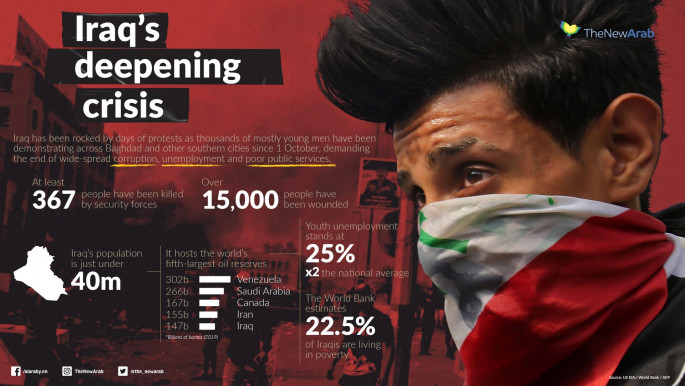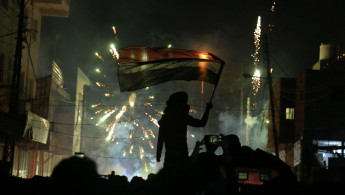'Not enough': Iraqis maintain anti-regime protests despite PM's resignation
Prime Minister Adel Abdel Mahdi announced on Friday he was planning to submit his resignation to parliament but the following day, protests were still ongoing in his birthplace of Nasiriyah, in Iraq's south.
Demonstrations set tyres ablaze on three bridges spanning the Euphrates River as hundreds more converged in the main protest camp in the flashpoint city's centre, according to an AFP correspondent.
Their renewed rallies came despite a bloody crackdown by security forces that left more than 40 protesters dead over the past two days in the city.
The violence was unleashed after protesters stormed and burned the Iranian consulate in the shrine city of Najaf, accusing Iraq's neighbour of propping up the Baghdad government.
That city, too, saw security forces and armed men in civilian clothes try to snuff out rallies in the aftermath of the consulate torching, leaving more than 20 protesters dead, medics told AFP.
Five of them were shot dead by men in civilian clothes who fired on young protesters approaching a revered religious tomb or political party headquarters.
The city of Najaf was relatively calm on Saturday, according to AFP's correspondent, but protests there usually swell in the afternoon and evening.
Iraq's second holy city Karbala was rocked by overnight clashes between young protesters and security forces trading fire bombs until the early hours of the morning.
And in Diwaniyah, thousands hit the streets early to demand "the downfall of the regime."
"We'll keep up this movement. Abdel Mahdi's resignation is only the first step, and now all corrupt figures must be removed and judged," one protester told AFP.
For weeks, Sistani had called for restraint in dealing with demonstrators and urged political parties to get "serious" about reform, but he ramped up demands on Friday.
"The parliament, from which this current government is drawn, is asked to reconsider its choice in this regard," he said in Friday's sermon delivered by a representative.
Within minutes, MP and former premier Haider al-Abadi called on lawmakers to convene Saturday for a "special session for a vote of no-confidence and to form a new independent government".
And the powerful Hashed al-Shaabi paramilitary network, which had backed the government, also appeared to change course.
Its parliamentary bloc, Fatah, called for "the necessary changes in the interests of Iraq".
In a written statement on Friday Abdel Mahdi said he would submit a formal letter to parliament "requesting my resignation" in keeping with the wishes of the country's top cleric, Grand Ayatollah Ali Sistani.
The premier did not say give further details but parliament is due to meet on Sunday.
Adel Abdul Mahdi's written statement was greeted with cheers and blaring music across Baghdad's iconic Tahrir (Liberation) Square, where crowds have amassed since early October against a ruling class deemed corrupt and inefficient.
"I will submit to the esteemed parliament a formal letter requesting my resignation from the premiership," Abdul Mahdi wrote, just hours after Grand Ayatollah Ali Sistani called in his weekly sermon on parliament to replace the cabinet.
 |
The sermon set off an avalanche of statements from political figures in support of a no-confidence vote on the government, before the prime minister's announcement.
Celebrations broke out in Tahrir, where young protesters dropped the stones they were preparing to throw at riot police and began dancing, an AFP photographer said.
The grassroots movement is the largest Iraq has seen in decades and also the deadliest, with more than 420 people killed and 15,000 wounded in Baghdad and the Shia-majority south, according to an AFP tally.
The rising deaths have sparked global criticism, with the United Nations saying the deaths "cannot be tolerated" and the French foreign ministry saying it "strongly condemns the excessive and disproportionate use of force against protesters”.
Iraq is OPEC's second-largest crude producer but one in five Iraqis lives in poverty and youth unemployment stands at 25 percent, according to the World Bank.
Demonstrators have also called out Iraq's large eastern neighbour Iran, accusing it of political, economic and military overreach.
Top Iranian commander Qasem Soleimani last month convinced political factions to back the government, including firebrand cleric Moqtada Sadr, who had called on the premier to resign.
But as the tide appeared to turn again, Sadr resurfaced Thursday, saying it would "be the beginning of the end for Iraq" if the government did not step down.





 Follow the Middle East's top stories in English at The New Arab on Google News
Follow the Middle East's top stories in English at The New Arab on Google News


